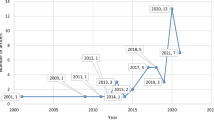Abstract
I start by introducing some ideas from the field of science and technology studies that concern the difficulty of differentiating experts and laypeople. Based on this description I react to Albæk’s comment and further explain the approach taken in my study. The results of the study indicate that the function of different types of sources can vary or overlap and that it is not always possible to unequivocally determine whether a source is represented as, for example, an expert, a representative of a particular worldview or institution, a citizen or more of the above. It is suggested that more research is needed on the issue how different types of journalists and specialist correspondents select and use their sources and how science education is represented in the media. The study of (science) education in the media is still a neglected issue and some of the benefits of getting a better understanding of the public representation of science education are pointed out.
Similar content being viewed by others
References
Albæk, E. (2011). Does journalistic objectivity have more than one voice? Cultural Studies of Science Education.
Allgaier, J. (2010a). Scientific experts and the controversy about teaching creation/evolution in the UK press. Science & Education, 19, 797–819.
Allgaier, J. (2010b). Discursive coalitions and collaborative networks of experts in a public creationism controversy in the UK. Public Understanding of Science. Retrieved January, 31, 2011 from. http://pus.sagepub.com/content/early/2010/11/16/0963662510383385.full.pdf+html.
Bryce, T. G. K. (2010). Sardonic science? The resistance to more humanistic forms of science education. Cultural Studies of Science Education, 5, 591–612.
Giddens, A. (1990). The consequences of modernity. Cambridge: Polity.
Köcher, R. (1986). Bloodhounds or missionaries: Role definitions of German and British journalists. European Journal of Communication, 1, 43–64.
Leadbeater, C., & Miller, P. (2004). The pro-am revolution: How enthusiasts are changing our economy and society. London: Demos.
Limoges, C. (1993). Expert knowledge and decision-making in controversy contexts. Public Understanding of Science, 2, 417–426.
Michael, M. (1996). Ignoring science: Discourses of ignorance in the public understanding of science. In A. Irwin & B. Wynne (Eds.), Misunderstanding science? The public reconstruction of science and technology (pp. 107–125). Cambridge: Cambridge University Press.
Michael, M. (2006). Technoscience and everyday life. Maidenhead: Open University Press.
Reiss, M. J. (1993). Science education for a pluralist society. Buckingham: Open University Press.
Reiss, M. (2011). Teachers as journalists? Cultural Studies of Science Education.
Wynne, B. (1995). Public understanding of science. In S. Jasanoff, G. E. Markle, J. C. Petersen, & T. Pinch (Eds.), Handbook of science and technology studies (pp. 361–388). London: Sage.
Wynne, B. (1996). May the sheep safely graze? a reflexive view of the expert-lay knowledge divide. In S. Lash, B. Szerszynski, & B. Wynne (Eds.), Risk, environment and modernity. Towards a new ecology (pp. 44–83). London: Sage.
Author information
Authors and Affiliations
Corresponding author
Additional information
Forum rejoinder for the original paper: J. Allgaier (2011). Who is having a say? Journalists' selection of sources in a science education controversy in the UK press. Cultural Studies of Science Education.
Rights and permissions
About this article
Cite this article
Allgaier, J. The difficulty of differentiating expertise and the functions of expert sources and the necessity of studying science education in the media. Cult Stud of Sci Educ 6, 479–484 (2011). https://doi.org/10.1007/s11422-011-9330-x
Received:
Accepted:
Published:
Issue Date:
DOI: https://doi.org/10.1007/s11422-011-9330-x




